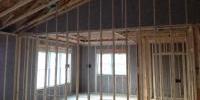
Homeowners in Illinois and Indiana know that focusing on home performance can help lower energy bills, improve home comfort and reduce one’s carbon footprint. Much of this has to do with living in a home that is properly insulated. The details surrounding insulation may be a bit confusing at face value, yet people know they need it. It’s often thought that insulation is only important during the cold months of winter, but the needs are also there throughout summer and fall.
Understanding how insulation works and why it’s so necessary for improving home performance doesn’t have to be difficult, and the more you know, the better equipped you’ll be to improve home performance in your home.
The Primary Function of Insulation
Rather than get lost in the finer points of insulation, it’s best to gain a simple understanding of the true purpose it serves. The primary function of insulation in any scenario is to provide resistance to heat & energy flow.
Take a moment to think about the walls of your home and how conditioned inside air is transferred through them to the outside. In a home that is poorly insulated, hot and cool air both have a much easier time escaping, which also means that unconditioned air from outside can enter without too much effort. In a home that is properly insulated, conditioned air is unable to penetrate the walls like it might otherwise be able to, which means it stays put where it belongs.
Conduction, Convection and Radiant Heat
Another part of understanding how insulation works is to grasp the function of heat flow, which is made up of three distinct actions — conduction, convection and radiant heat. In a nutshell, conduction heat moves through materials, convection heat moves around materials and radiant heat travels in a straight line, heating everything that it encounters along the way. As you might expect, most insulation functions by slowing conductive heat, which can have a rather large impact on home performance.
The basic gist to walk away with is that maintaining a cool home in the summer and a warm home in the winter means relying on your HVAC system. No matter how high in quality your HVAC system may be, it will only work properly if the home is properly insulated. A well insulated home helps to keep conditioned air inside and unconditioned air outside, which is essential for those days when it’s either really hot or really cold out.
